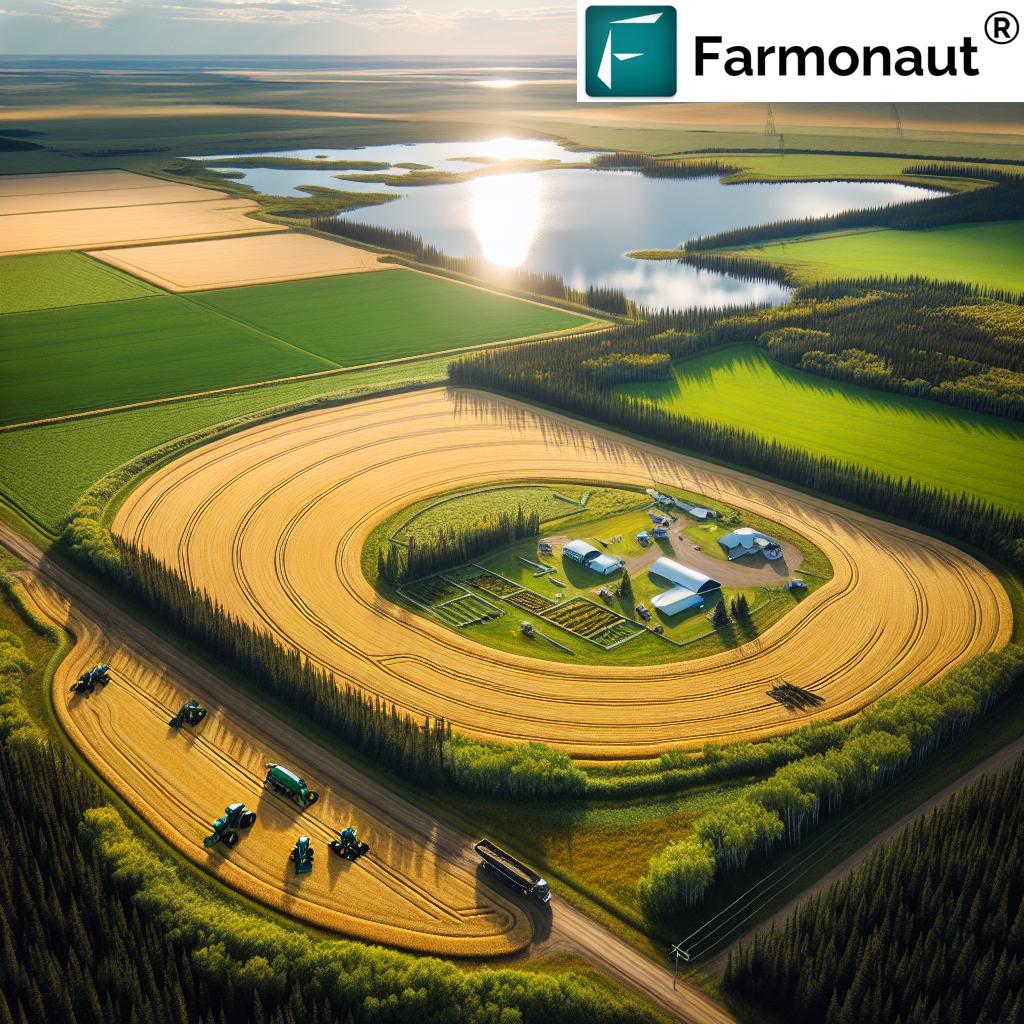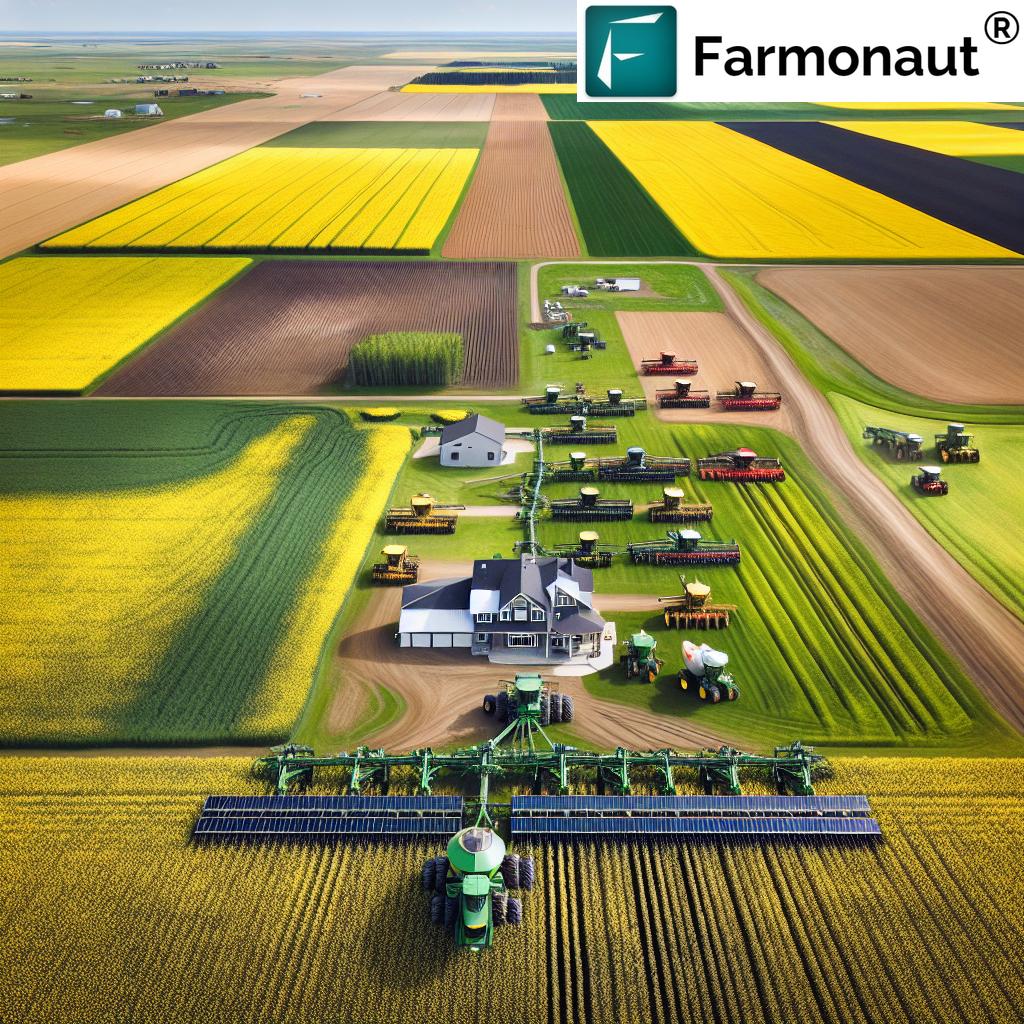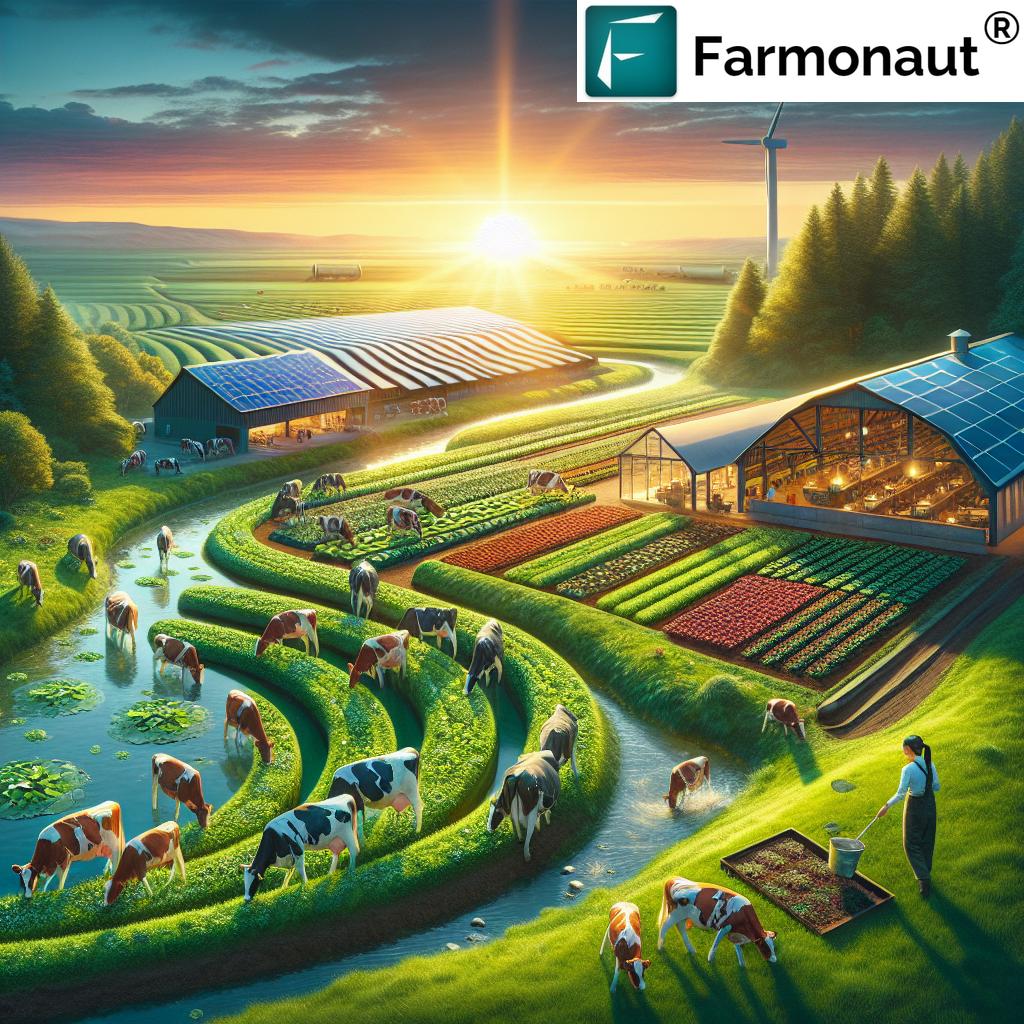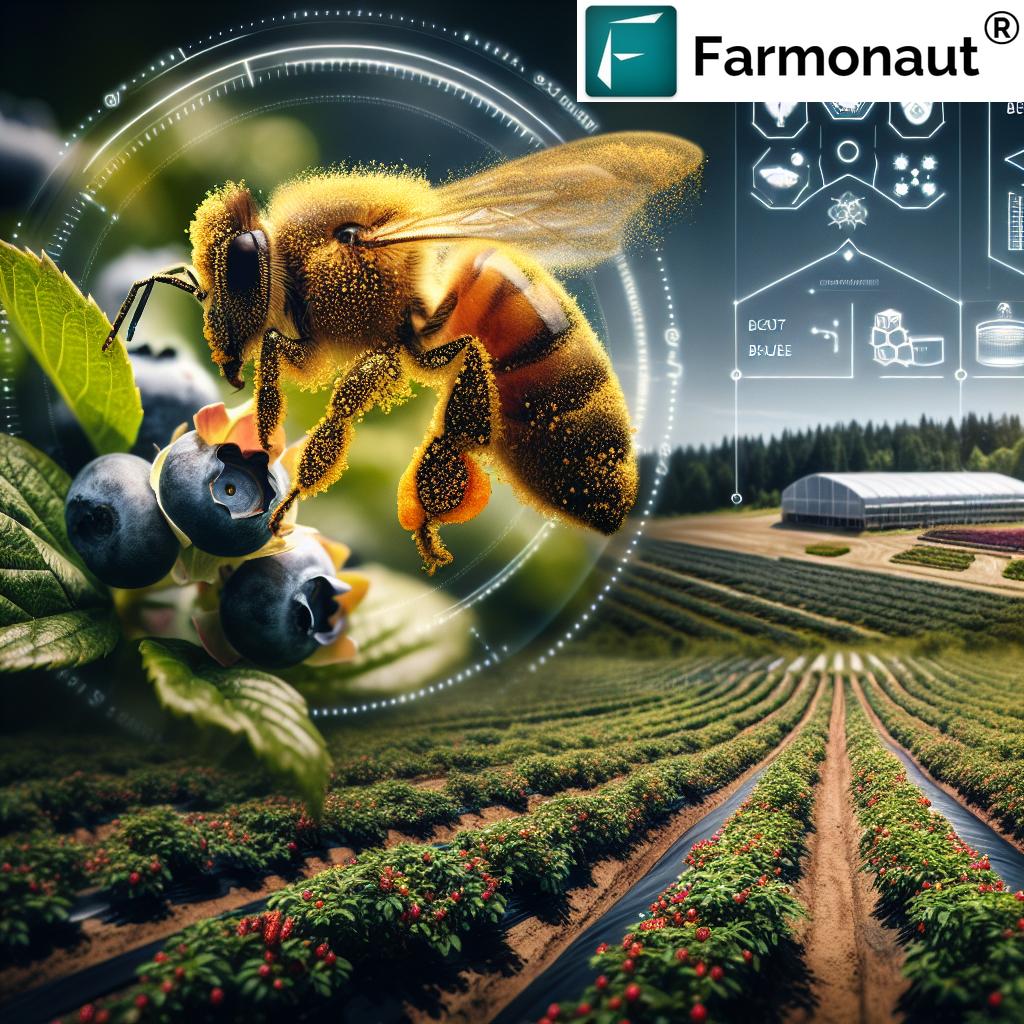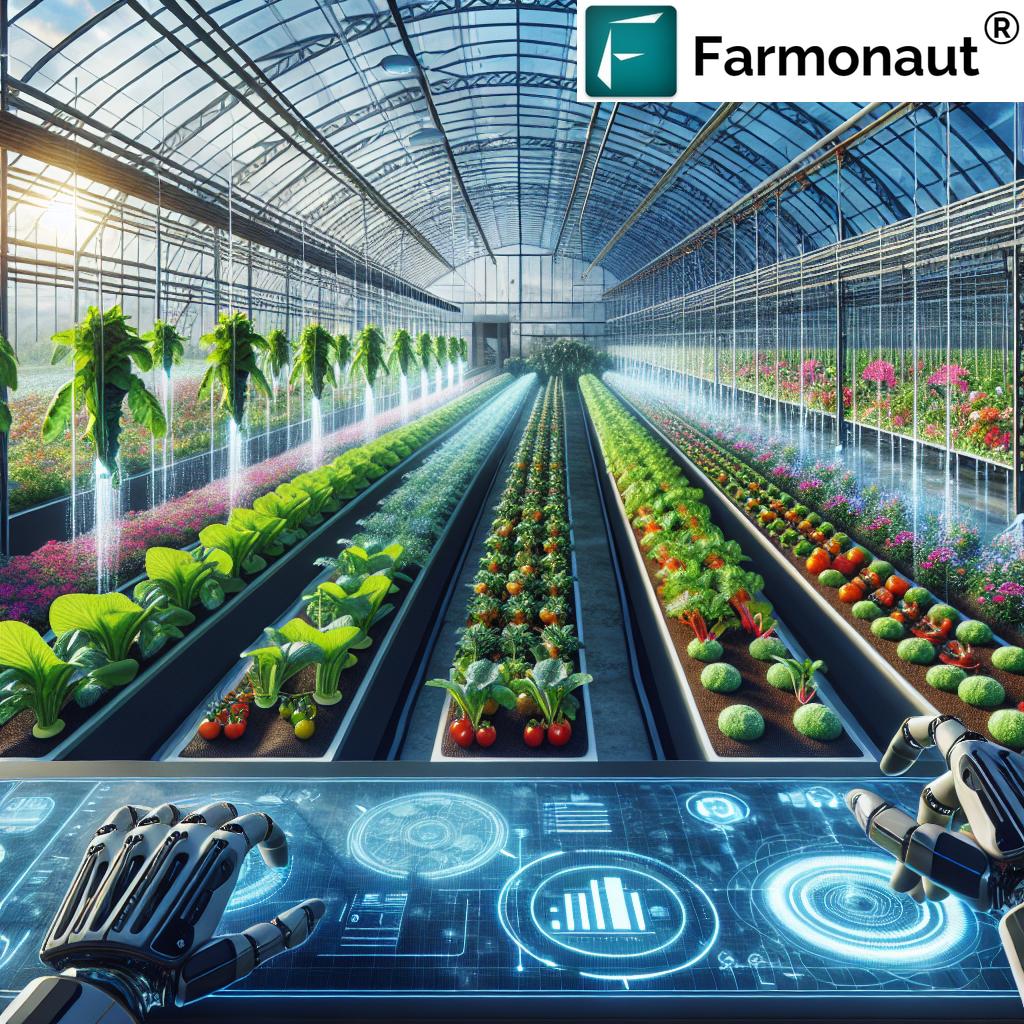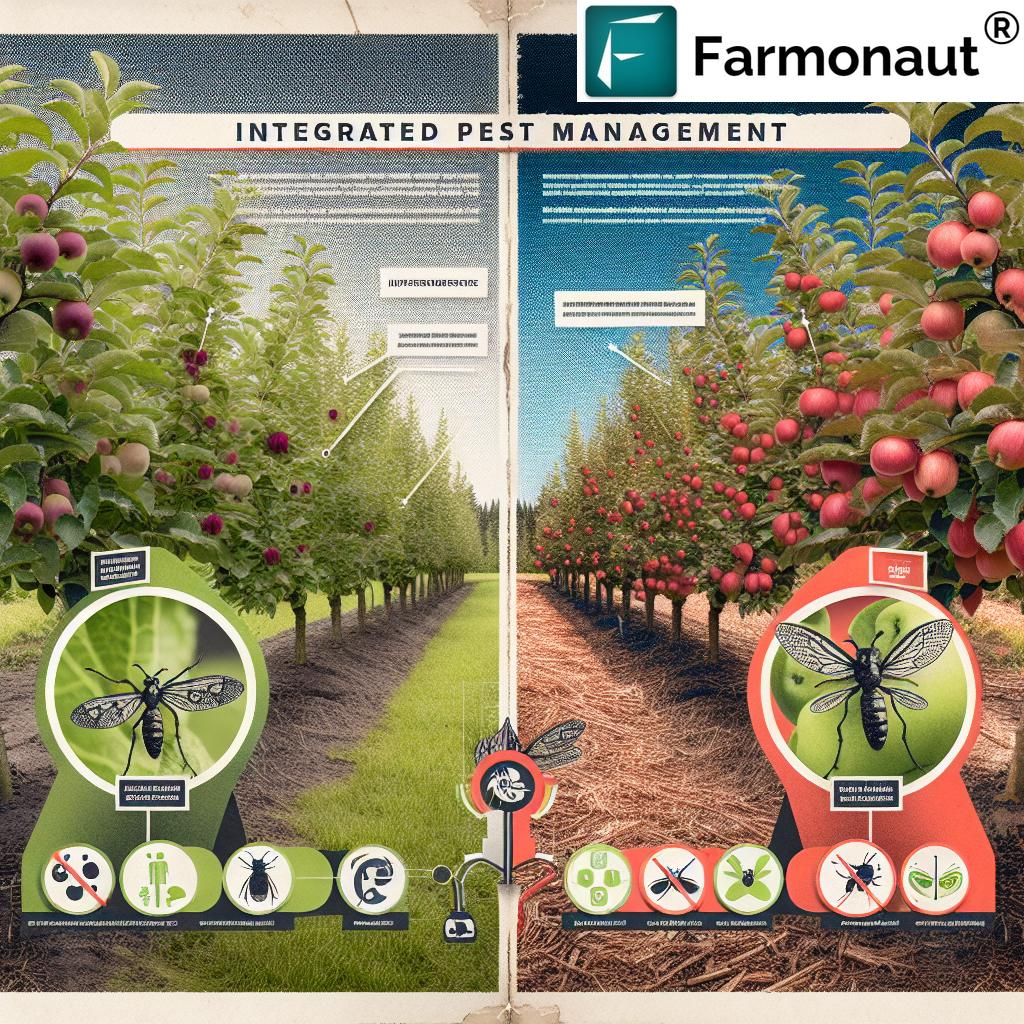From Silage to Robotics: Manitoba’s Innovative Farming Practices Transforming Agriculture
“Robotic milking systems can increase dairy production by up to 15% while reducing labor costs by 20-30%, Manitoba farmers report.”
Welcome to our comprehensive exploration of Manitoba’s agricultural revolution! In this blog post, we’ll dive deep into the innovative farming practices and modern agriculture technology that are reshaping the landscape of Canadian agriculture. From the rolling prairies to the bustling dairy farms, we’re witnessing a transformation that’s not just changing how we farm, but also how we think about farming.
The Evolution of Manitoba’s Agricultural Landscape
Manitoba, known for its vast expanses of farmland and rich agricultural heritage, is at the forefront of adopting sustainable farming practices. As we navigate through the challenges of the 21st century, from climate change to increasing food demand, our farmers are stepping up with innovative solutions that blend traditional wisdom with cutting-edge technology.
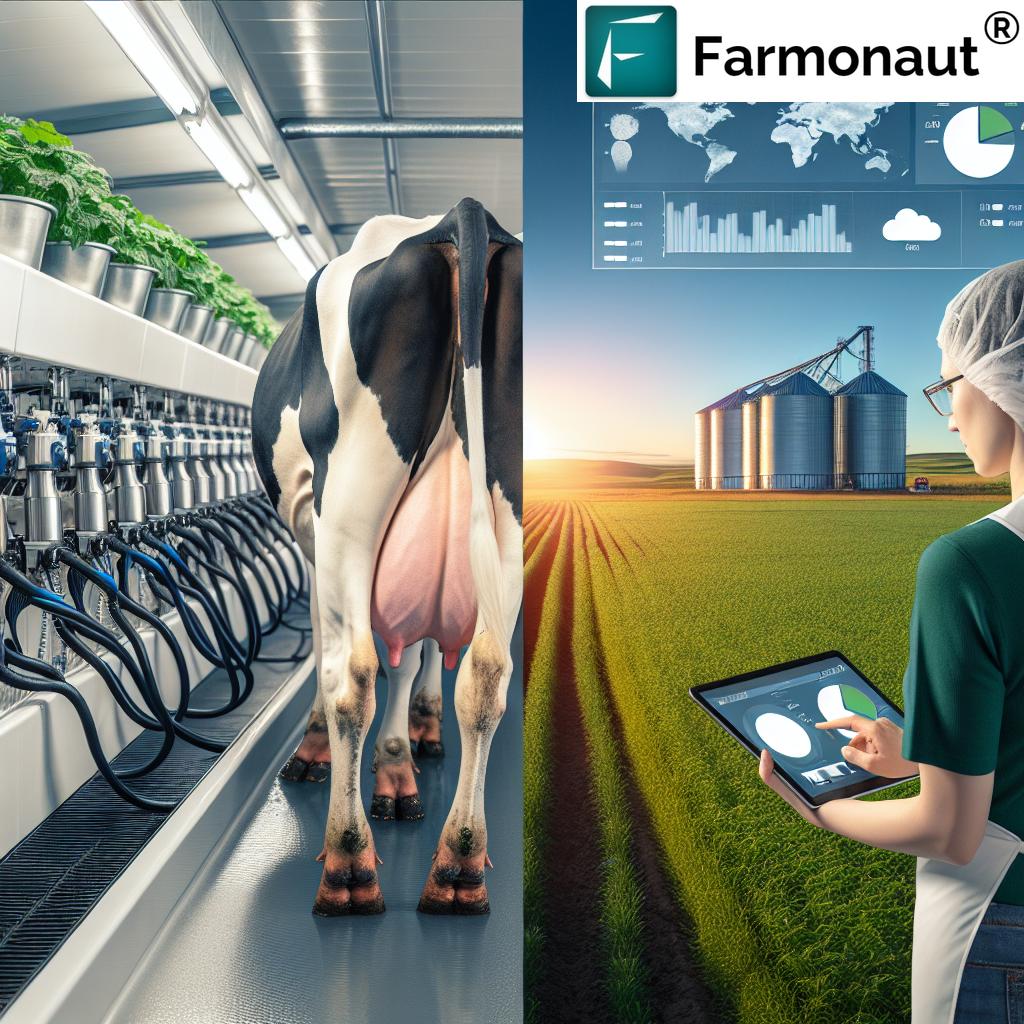
In recent years, we’ve seen a surge in the adoption of modern agriculture technology across the province. From small family farms to large-scale operations, farmers are embracing change to improve efficiency, sustainability, and profitability. Let’s explore some of the key areas where innovation is making a significant impact.
Robotic Milking Systems: Revolutionizing Dairy Farming
One of the most exciting developments in Manitoba’s dairy sector is the widespread adoption of robotic milking systems. These automated marvels are transforming the way we approach dairy farm innovation, offering benefits that extend far beyond mere convenience.
- Increased Productivity: Robotic systems allow cows to be milked on their own schedule, often resulting in more frequent milking and higher milk yields.
- Improved Animal Welfare: The stress-free environment created by robotic milking can lead to healthier, happier cows.
- Data-Driven Decision Making: Advanced sensors in robotic systems provide farmers with detailed health and production data for each cow.
Let’s take a closer look at how these systems are changing the game for Manitoba’s dairy farmers:
As we can see, the benefits of robotic milking systems are substantial. But it’s not just about the technology itself; it’s about how this technology is enabling farmers to reimagine their entire approach to dairy farming.
Silage Management: Optimizing Feed Quality
Moving from the milking parlor to the feed storage, we find another area where Manitoba farmers are making significant strides: silage management. Proper silage management is crucial for maintaining high-quality feed for livestock, and innovative techniques are helping farmers achieve better results than ever before.
“Manitoba’s innovative silage management techniques have improved feed quality by 25%, leading to a 10% increase in livestock productivity.”
Here are some silage management tips that are making a difference:
- Precision Chopping: Using advanced chopping equipment to ensure optimal particle size for fermentation.
- Rapid Packing: Employing efficient packing methods to remove oxygen and promote proper fermentation.
- Inoculant Application: Utilizing bacterial inoculants to enhance fermentation and preserve nutrients.
- Proper Sealing: Implementing airtight sealing techniques to prevent spoilage and maintain quality.
By focusing on these aspects of silage management, Manitoba farmers are seeing improvements in feed quality that translate directly to better livestock health and productivity.
Precision Agriculture: Harnessing the Power of Data
In the realm of crop management, precision agriculture is revolutionizing how we approach farming. By leveraging data and technology, farmers can make more informed decisions about everything from seeding to harvesting.
At Farmonaut, we’re proud to be at the forefront of this revolution, offering advanced satellite-based farm management solutions that put the power of precision agriculture in the hands of farmers. Our platform provides real-time crop health monitoring, AI-based advisory systems, and resource management tools that help farmers optimize their operations.
Explore Farmonaut’s innovative solutions:
Some key benefits of precision agriculture include:
- Optimized Resource Use: Precise application of water, fertilizers, and pesticides reduces waste and environmental impact.
- Increased Yields: Data-driven decision-making leads to better crop management and higher yields.
- Cost Savings: By targeting inputs more effectively, farmers can reduce overall costs.
- Environmental Stewardship: Precision techniques help minimize the environmental footprint of farming operations.
Innovative Livestock Housing: Comfort Meets Compliance
The way we house our livestock has a significant impact on animal welfare, productivity, and overall farm efficiency. In Manitoba, farmers are adopting innovative livestock housing solutions that not only meet regulatory compliance but also prioritize animal comfort and health.
Some key features of modern livestock housing include:
- Climate Control: Advanced ventilation and temperature management systems.
- Automated Feeding Systems: Ensuring consistent and timely feeding schedules.
- Comfortable Bedding: Using materials and designs that promote animal comfort and cleanliness.
- Smart Monitoring: Integrating sensors and cameras for real-time health and behavior monitoring.
These innovations in livestock housing are not just about compliance; they’re about creating environments where animals can thrive, leading to better health outcomes and increased productivity.
Agricultural Planning Strategies: A Holistic Approach
Success in modern farming isn’t just about adopting new technologies; it’s about integrating these innovations into a comprehensive agricultural planning strategy. Manitoba farmers are increasingly taking a holistic approach to farm management, considering everything from crop rotation and soil health to market trends and economic planning.
Key components of effective agricultural planning include:
- Crop Diversification: Reducing risk and improving soil health through varied crop rotations.
- Sustainable Practices: Incorporating conservation tillage, cover crops, and other environmentally friendly techniques.
- Market Analysis: Staying informed about market trends to make informed planting and selling decisions.
- Financial Planning: Utilizing tools and expertise to manage farm finances effectively.
By taking a strategic approach to farm management, Manitoba’s farmers are not just surviving; they’re thriving in an ever-changing agricultural landscape.
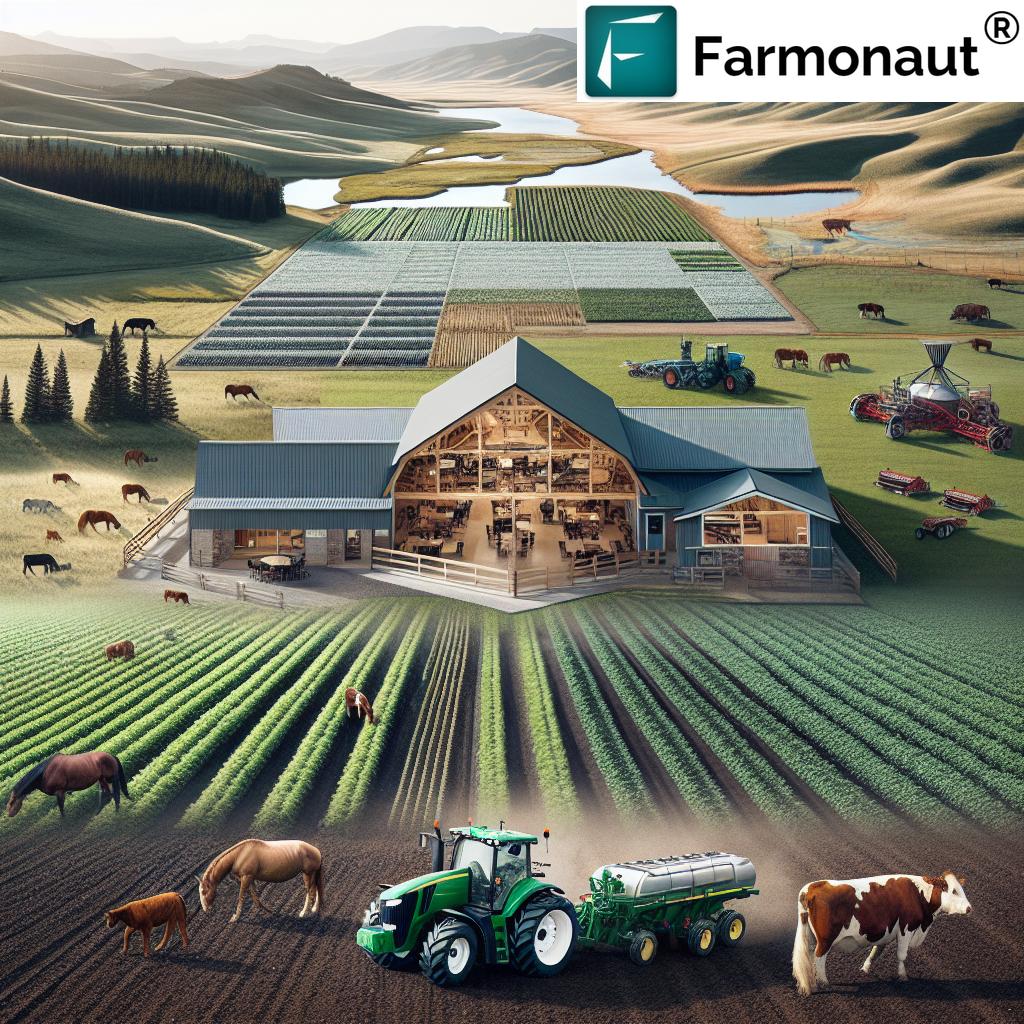
Traditional Ranching Techniques Meet Modern Innovation
While we’re embracing new technologies, it’s important to recognize the value of traditional ranching techniques that have stood the test of time. In Manitoba, we’re seeing a fascinating blend of old and new, where time-honored practices are being enhanced by modern innovations.
This video showcases how ranchers in neighboring Alberta are adapting traditional techniques to modern challenges, a trend we’re also seeing in Manitoba. Some ways traditional ranching is being modernized include:
- GPS Tracking: Using technology to monitor herd movements and grazing patterns.
- Regenerative Grazing: Implementing rotational grazing systems that mimic natural patterns.
- Drone Technology: Employing drones for herd monitoring and land assessment.
- Digital Record Keeping: Utilizing software for more efficient herd management and record-keeping.
Irrigation Innovation: Precision Water Management
Water is a precious resource, and Manitoba farmers are at the forefront of adopting innovative irrigation methods that maximize efficiency while minimizing waste. Modern irrigation techniques are not just about applying water; they’re about applying the right amount of water at the right time and in the right place.
Some cutting-edge irrigation technologies include:
- Drip Irrigation: Precise water delivery directly to plant roots, reducing evaporation and runoff.
- Smart Sprinkler Systems: Using weather data and soil moisture sensors to optimize watering schedules.
- Variable Rate Irrigation: Adjusting water application rates based on field variability and crop needs.
- Subsurface Drip Irrigation: Delivering water below the soil surface for even greater efficiency.
These advanced irrigation methods are helping Manitoba farmers conserve water, reduce energy costs, and improve crop yields, all while promoting sustainable water management practices.
Farmstead Projects: Building for the Future
The heart of any farm is its farmstead, and Manitoba farmers are undertaking innovative projects to modernize and optimize their farm infrastructure. These projects range from energy-efficient building designs to integrated smart systems that streamline farm operations.
Some exciting farmstead projects we’re seeing include:
- Solar-Powered Barns: Harnessing renewable energy to power farm operations.
- Automated Grain Storage: Implementing smart systems for efficient grain handling and storage.
- Multifunctional Farm Buildings: Designing flexible spaces that can adapt to changing farm needs.
- Water Recycling Systems: Capturing and reusing water for various farm applications.
These farmstead projects are not just about improving current operations; they’re about building a foundation for the future of farming in Manitoba.
Quality Control in Agriculture: Ensuring Excellence
In today’s competitive agricultural market, quality control is more important than ever. Manitoba farmers are implementing rigorous farm quality control methods to ensure their products meet and exceed market standards.
Key aspects of agricultural quality control include:
- Soil Testing: Regular analysis to maintain optimal soil health and fertility.
- Crop Monitoring: Utilizing technologies like satellite imagery and drones for early detection of issues.
- Post-Harvest Handling: Implementing best practices for storage and transportation to maintain product quality.
- Certification Programs: Participating in quality assurance programs to validate farming practices.
By focusing on quality control, Manitoba farmers are not just producing crops and livestock; they’re producing excellence.
The Role of Young Farmers in Agricultural Innovation
The future of farming in Manitoba is bright, thanks in large part to the influx of young farmers who are bringing fresh perspectives and innovative ideas to the industry. These young agricultural entrepreneurs are not just inheriting farms; they’re transforming them.
This video showcases how young farmers are balancing tradition with innovation, a trend we’re seeing across Manitoba. Some ways young farmers are making their mark include:
- Tech Adoption: Embracing new technologies and digital tools for farm management.
- Sustainable Practices: Prioritizing environmentally friendly farming methods.
- Diversification: Exploring new crops and value-added products to expand farm income.
- Community Engagement: Using social media and direct marketing to connect with consumers.
Navigating Market Challenges: Strategies for Success
In an ever-changing global market, Manitoba farmers are developing innovative strategies to navigate economic challenges and seize new opportunities. From diversifying income streams to exploring niche markets, our farmers are proving to be as adept at business as they are at agriculture.
Some key strategies include:
- Value-Added Products: Processing raw agricultural products to create higher-value goods.
- Direct-to-Consumer Sales: Utilizing farmers’ markets and online platforms to sell directly to consumers.
- Agritourism: Offering farm tours, pick-your-own experiences, and on-farm events.
- Cooperative Marketing: Joining forces with other farmers to increase market power and reach.
By adapting to market trends and consumer preferences, Manitoba’s farmers are ensuring the long-term viability of their operations.
Nature-Based Approaches: Farming in Harmony with the Environment
As we look to the future of farming in Manitoba, there’s a growing emphasis on nature-based approaches that work in harmony with the environment. These methods not only promote sustainability but often lead to more resilient and productive farming systems.
Some nature-based farming practices gaining traction include:
- Agroforestry: Integrating trees and shrubs into crop and animal farming systems.
- Wetland Conservation: Preserving and restoring wetlands for biodiversity and water management.
- Pollinator Habitat Creation: Establishing areas to support bees and other crucial pollinators.
- Natural Pest Control: Using biological controls and habitat management to reduce pest pressures.
These nature-based approaches demonstrate that productivity and environmental stewardship can go hand in hand.
The Future of Farming in Manitoba: A Vision of Innovation and Sustainability
As we look ahead, the future of farming in Manitoba is bright with promise. The innovative practices and technologies we’ve explored are just the beginning. We anticipate continued advancements in areas such as:
- Artificial Intelligence in Agriculture: Further integration of AI for predictive analytics and automated decision-making.
- Vertical Farming: Exploring urban agriculture solutions to complement traditional farming.
- Blockchain in Agriculture: Enhancing traceability and transparency in the food supply chain.
- Climate-Resilient Crop Varieties: Developing crops better adapted to changing environmental conditions.
These innovations, combined with the ingenuity and resilience of Manitoba’s farmers, position our province to be a leader in sustainable, efficient, and productive agriculture for generations to come.
Comparison of Traditional and Innovative Agricultural Practices in Manitoba
| Agricultural Area | Traditional Method | Innovative Technology/Practice | Estimated Efficiency Gain (%) | Environmental Impact |
|---|---|---|---|---|
| Dairy Farming | Manual Milking | Robotic Milking Systems | 15-20% | Medium |
| Silage Management | Manual Packing and Sealing | Automated Silage Management Systems | 25% | Low |
| Irrigation | Flood Irrigation | Precision Drip Irrigation | 30-50% | High |
| Livestock Housing | Standard Barns | Smart Barns with Climate Control | 10-15% | Medium |
| Crop Monitoring | Manual Field Scouting | Satellite/Drone-based Monitoring | 40-60% | Low |
Frequently Asked Questions (FAQ)
Q1: What are the main benefits of robotic milking systems for dairy farmers in Manitoba?
A1: Robotic milking systems offer increased milk production, reduced labor costs, improved animal welfare, and provide detailed health and production data for each cow.
Q2: How are Manitoba farmers improving silage management?
A2: Farmers are using precision chopping equipment, rapid packing methods, bacterial inoculants, and airtight sealing techniques to improve silage quality and preserve nutrients.
Q3: What role does precision agriculture play in Manitoba farming?
A3: Precision agriculture helps Manitoba farmers optimize resource use, increase yields, reduce costs, and minimize environmental impact through data-driven decision-making and targeted input application.
Q4: How are young farmers contributing to agricultural innovation in Manitoba?
A4: Young farmers are driving innovation by adopting new technologies, prioritizing sustainable practices, diversifying farm operations, and engaging with consumers through social media and direct marketing.
Q5: What are some nature-based farming approaches gaining traction in Manitoba?
A5: Nature-based approaches include agroforestry, wetland conservation, pollinator habitat creation, and natural pest control methods that work in harmony with the environment.
Conclusion: Embracing the Future of Farming in Manitoba
As we’ve explored throughout this blog post, Manitoba’s agricultural sector is undergoing a remarkable transformation. From robotic milking systems revolutionizing dairy farms to precision agriculture techniques optimizing crop production, our farmers are at the forefront of innovation.
The blend of traditional wisdom and cutting-edge technology is creating a new paradigm for sustainable, efficient, and productive farming. As we look to the future, it’s clear that Manitoba’s agricultural industry is well-positioned to meet the challenges of feeding a growing population while preserving our natural resources.
We invite you to be part of this exciting journey. Whether you’re a farmer looking to adopt new technologies, a consumer interested in where your food comes from, or simply someone fascinated by the intersection of technology and agriculture, there’s never been a more exciting time to engage with Manitoba’s farming community.
Stay informed, support local farmers, and be part of the conversation shaping the future of agriculture in Manitoba and beyond. Together, we can cultivate a future where innovation and sustainability go hand in hand, ensuring a thriving agricultural sector for generations to come.
Explore Farmonaut’s Innovative Solutions
At Farmonaut, we’re proud to support Manitoba’s farmers with cutting-edge satellite-based farm management solutions. Our platform offers real-time crop health monitoring, AI-based advisory systems, and resource management tools to help farmers optimize their operations and embrace precision agriculture.
Discover how Farmonaut can transform your farming practices:
- Web App: Access our powerful farm management tools
- API: Integrate our data into your existing systems
- Developer Docs: Learn how to leverage our API
Join the agricultural revolution with Farmonaut and take your farming to the next level!






